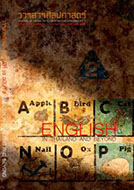From Teaching English as a Foreign Language to Using English as a Global language: Another Look at Pedagogy for English Education in Thailand
Main Article Content
บทคัดย่อ
Teaching English in non-English environments has been found problematic in countless studies. When it comes to the language skills of teachers, especially non-native English speaking teachers, the superiority of native speakers in such skills as listening and speaking, reading and vocabulary even causes these non-native teachers, including those in Thai educational contexts, to feel insecure. This is even truer as we have been bombarded with a lot of change in political and educational arenas. To survive with more confidence in teaching, we may take into account critical perspectives in teaching, the new status of English through the lens of World Englishes, and approaches to English instruction so we can train Thai students to be ready for any demanding tasks in job markets—local and regional—where their language competence and cultural identities should both be emphasized.
การสอนภาษาอังกฤษในบริบทที่ไม่ใช่เจ้าของภาษามีปัญหามากมายและในเรื่องของทักษะทางภาษาของผู้สอนเองโดยเฉพาะอย่างยิ่งผู้สอนที่ไม่ใช่เจ้าของภาษานั้น พบว่าผู้สอนมักไม่มีความมั่นใจในความสามารถของตนทั้งทักษะการฟัง การพูด การอ่าน และความรู้ด้านคำ ศัพท์ เมื่อเทียบกับความสามารถของเจ้าของภาษา ซึ่งปัญหาดังกล่าวเป็นปัญหาที่เกิดขึ้นกับผู้สอนชาวไทยเช่นกันโดยเฉพาะอย่างยิ่งในภาวะที่เกิดกระแสการเปลื่ยนแปลงมากมายทั้งในเรื่องการเมืองการปกครองและการศึกษา ในการแก้ปัญหาดังกล่าวและเพื่อเสริมสร้างความมั่นใจของผู้สอนให้มากขึ้น ผู้สอนอาจพิจารณาการผสมผสานแนวคิดเชิงวิพากย์ สถานภาพของภาษาอังกฤษตามแนวคิดภาษาอังกฤษนานาโลก ตลอดจนแนวคิดในการสอนภาษาอังกฤษเพื่อช่วยผู้เรียนชาวไทยให้มีความพร้อมตามความต้องการของตลาดแรงงานทั้งในประเทศไทยและประเทศเพื่อนบ้านซึ่งทุกบริบทต้องการผู้เรียนที่มีความสามารถทั้งทางภาษาและอัตลักษณ์ทางวัฒนธรรมในระดับสูง


